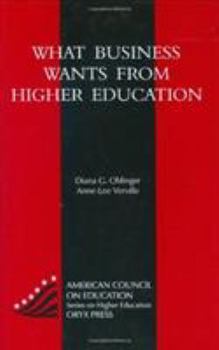What Business Wants From Higher Education: (American Council on Education Oryx Press Series on Higher Education)
It often seems that neither organizations nor people move fast enough to stay ahead of the changes brought about by globalization and technology. Yet both business and higher education are continually... This description may be from another edition of this product.
Format:Hardcover
Language:English
ISBN:1573562068
ISBN13:9781573562065
Release Date:June 1998
Publisher:Rowman & Littlefield Publishers
Length:200 Pages
Weight:1.10 lbs.
Dimensions:9.3" x 0.5" x 6.3"
Customer Reviews
1 rating
This book urges universities to adopt corporate values.
Published by Thriftbooks.com User , 25 years ago
"What Business Wants from Higher Education" lays out a blueprint for transforming higher education into a farm system for corporate America. At no point do Oblinger and Verville entertain the idea that a university and a corporation might have different (and perhaps incompatible) functions and values, or that one social contribution of a university might even be to provide an alternative to the corporate world. A university is simply a training ground for future corporate employees. It is a business like any other, with a product (degrees), customers (students), and "stakeholders" (that's right: "stakeholders," sort of like "stockholders"). And like a business, it must be competitive and strive for greater "productivity." How is productivity measured in a university? By extruding degrees more quickly, easily, and cheaply. And how is this to be accomplished? By heavy reliance on IT (instructional technology) and distance learning (spell: more sales of PC's, a not undesirable prospect for these two IBM employees). In addition to pitching electronic correspondence courses, "What Business Wants from Higher Education" endorses other educational panaceas du jour: students need less "seat time" (students don't need to go to class so darned often); students should be able to get academic credit for non-academic activities (internships and "life experience"); students need to become "active, lifetime learners" (an obvious truism the authors invoke to diminish the importance of school learning); and--oh yes--institutions must adopt "outcomes assessment" to ensure accountability. What is outcomes assessment? A euphemism for simplifying and dumbing down course objectives so that the "efficiency" of university classes can supposedly be measured. Oblinger and Verville are to be commended for their honesty, though. They make it clear that one principal attraction of outcomes assessment is that it will allow students to challenge and test out of courses more easily (we can already see campus entrepreneurs gearing up to crank out the inevitable study guides). Of course students will get their credits simply by displaying a minimal level of competency, but that is fine with the authors. Our lifetime learners are after easy credits and a quick certification, a realization that has made the founder of the University of Phoenix rich. Why all these changes? The stodgy university is falling behind the corporate world, where no paradigm lasts for more than six months (except perhaps for ideas like sending jobs offshore, employing as few people as possible, paying them the minimum, withholding job security and retirement benefits, and overcompensating corporate chieftains). Like corporations, the modern university needs to be in a constant mode of change, adopting innovations in the blink of an eye. The best way to prepare students for corporate life (presumably the only economically defensible funct





